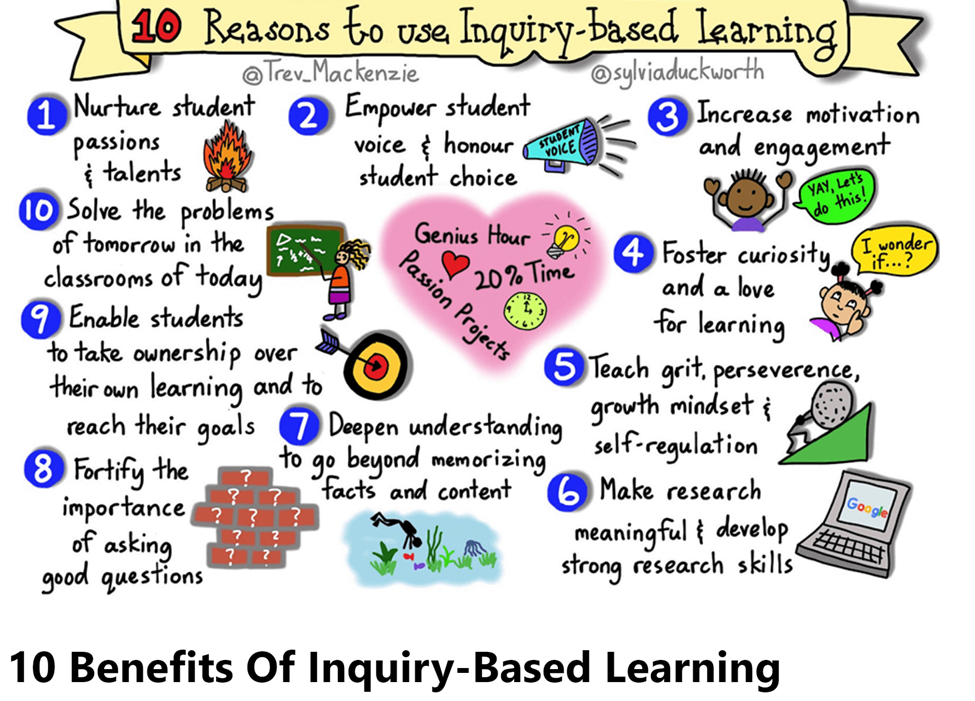Literacy Strategy 3: Inquiry-Based Learning
I
Image: TeachThought Staff / January 11, 2017 / Critical Thinking / Experienced Teacher, Fundamentals, Inquiry-based Learning
Inquiry-Based Learning
Literacy Strategy 3: Inquiry-Based Learning, also known as Project-Based or Experiential Learning.
There are 4 types of inquiry-based learning:
1. The Structured Inquiry Approach
2. The Open-Ended Inquiry Approach
3. The Problem-Based Inquiry Approach
4. The Guided Inquiry Approach
There are 7 benefits to inquiry-based learning:
1. Encourages critical thinking
2. Improves problem-solving skills
3. Encourages creativity
4. Improves communication skills
5. Connects learning to the real world
6. Helps students understand complex topics
7. Encourages engaged learning
Five inquiry-based learning examples are:
1. Science experiments
2. Field trips
3. Classroom debates
4. Projects
5. Group work
Example injury-based learning project:
As a project-based (or inquiry-based) choice assignment, I would like to research my family history and ancestry using the open-ended inquiry approach, where do I begin?
I can begin by exploring my own knowledge of my family and family history. I will begin by exploring the makeup of my family: my siblings, my aunts, uncles, and cousins? I will include my parents and grandparents and their parents and grandparents if I have that information.
Ways to research my family history would be to interview some of my family members. Maybe there are some family members who would have a collection of old family photographs or historical family data. I remember that my grandmother used to keep names, marriages, and births in her bible. I also know that the U.S. Census Bureau has historical data, maybe I can find some of my relatives there?
An adopted person who does not know his or her family could at least get information about their family heritage or origins by taking a DNA test. Also, doing a Google search may reveal information about any relatives that I or someone else know by name.
This type of research can be done individually, with a partner, or in a group. For example, I can ask my sister or other relatives to help me research our family history. Other ways to research historical data are through:
- Family Search
- Olive Tree Genealogy
- Ancestry.com
- Living DNA
- Ancestry DNA
- My Heritage DNA
- Genealogy Bank DNA
- Your personal knowledge and records
- Family records
- Census records
- Purchase or find a free or trial version of genealogy software
This website has information about inquiry-based learning: https://www.splashlearn.com/blog/what-is-inquiry-based-learning-a-complete-overview/#6
Here are 5 strategies and tips for implementing inquiry-based learning:
1. Start with a Question
Inquiry bases learning starts with a question. To make a family tree, begin with the date of your birth and work backwards. When, where, and under what circumstances was I born?
2. Allow for Exploration
Explore the topic on your own based on what you can discover about what goes on during a family history search.
3. Encourage Discussion
Discuss your ideas with your close family members and with peers who may be interested in the same type of research.
4. Provide Resources
Find a list of resources such as Ancestry.com and other resources listed above that are used to do genealogy searches. Check the records of your town and city around the time of your birth. There may be newspapers and books that can help in your search. Once, our local library completed a project on residents of the county and some of my relatives were featured.
5. Summarize What Was Learned At the end of the research on your family history, summarize what you have learned.
Conclusion
“Inquiry-based learning is promoted as a way to continually increase knowledge. The student starts with a body of knowledge that has already been acquired. This is used to help the student identify other things that are not known and to form educated guesses, or hypotheses, about those unknown things. Through research, observation, and the use of the five senses of sight, hearing, taste, touch, and smell, the student applies knowledge that has already been acquired to learning something new” (Ungvarsky, 2023).
References
SplashLearn. (2023). What is inquiry-based learning? Types, benefits, examples. https://www.splashlearn.com/blog/what-is-inquiry-based-learning-a-complete-overview/#6
TeachThought Staff. (2017). 10 benefits of inquiry-based learning. https://www.teachthought.com/critical-thinking/10-benefits-of-inquiry-based-learning/
Ungvarsky, J. (2023). Inquiry-based learning. Salem Press Encyclopedia.
